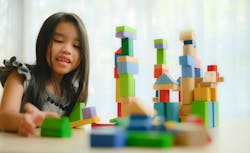Infants and children 5 years old and younger experienced only “modest” delays in developmental milestones due to the COVID-19 pandemic disruptions and restrictions, a study led by Johns Hopkins Children’s Center finds.
A report on the study was published April 22 in JAMA Pediatrics, investigators evaluated possible links between pandemic-related disruptions to everyday life and changes in developmental milestone screening scores. The data were from the Comprehensive Health and Decision Information System (CHADIS), a web-based screening platform caregivers use to complete surveys about their children’s development. It is used by more than 5,000 pediatric practices in 48 U.S. states.
Using the Ages and Stages Questionnaire-3 (ASQ-3), a caregiver-completed measure of child development routinely collected as part of pediatric care, researchers say they found only small decreases in communication, problem-solving, and personal-social skills, and no changes in fine or gross motor skills among children in the study.
Numerous studies, the researchers say, found the COVID-19 pandemic and related lockdown restrictions disrupted the lives of many people, including families with young children. Everyday life and daily routines were upended, as schools and childcare centers closed, many people began working from home and social contacts diminished. Many experienced increased stress, anxiety and social isolation due to these changes and activity cancellations.
Research has also shown the pandemic is linked to lower child health-related quality of life, increased mental health concerns, decreased sleep and increased risk of obesity. However, the impact of the pandemic on developmental milestones among young children in the U.S. remained unclear, in part because studies designed to address them were done outside the United States, or in small samples. In the new study, Children’s Center researchers looked at the developmental milestone status of 50,205 children, ages 0 to 5 years, drawn from a sample of more than half a million children whose parents or caregivers completed the ASQ-3. The ASQ-3 assesses children’s developmental milestones in five skill domains: communication, gross motor, fine motor, problem-solving and personal-social.
Researchers compared the children before and during the pandemic from 2018 to 2022 and found ASQ-3 score decreases in the communication (about 3%), problem-solving (about 2%) and personal-social (about 2%) skill domains. They found no changes in fine or gross motor skill domains. When looking specifically at infants 0–12 months old, similarly modest effects were observed, and there were only decreases in the communication domain (about 3%) and problem-solving domain (about 2%).
Also, given an increase in parent and caregiver worry and stress, researchers investigated whether parents and caregivers reported more worries about their child during the pandemic, regardless of milestone achievement, and found worries about their child only increased slightly during the pandemic, compared to before the pandemic.
While the researchers say the findings are reassuring, they add that the implications for children’s long-term development remain unclear.





